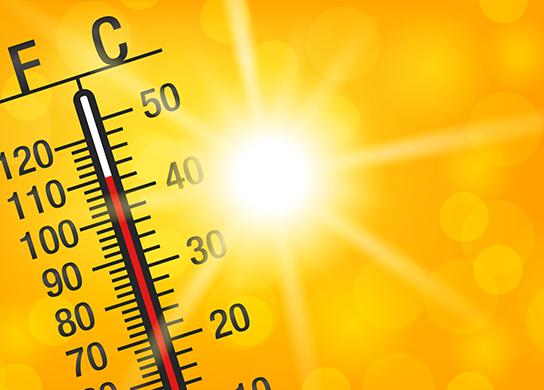Are You Ready for a Heat Wave?
July 1, 2020

By Kim McDonnell, Senior Manager, Community & Customer Experience
Summer is here and with that comes not only the heat but also other issues and safety precautions you need to take not only for yourself but for the truck as well.
First and foremost, let's talk about you, the person behind the wheel! One of the major things to pay attention to not only year-round but especially in the summer is proper hydration. You may think you won’t get dehydrated when you are in your air-conditioned truck but that is not necessarily true. Air conditioning can cause low water content in the atmosphere, leading to increased water loss from the lungs and through the skin. If you are not well hydrated you may experience symptoms such as headaches, loss of concentration, and tiredness. Stay away from sugar-filled drinks and sodas as they don’t really do a great job at keeping you hydrated and who needs all those extra calories. Of course, water is what is always recommended for hydration but if you don’t like the idea of just plain water add a slice of lemon or lime to it, and eating fruit and vegetables can also help to maintain the proper levels of hydration.
Make sure you also protect yourself against the sun. You may think because you are in your truck you don’t have to worry about the sun but you actually should. The sun is intensified in the summer months and still shines through the windows of your truck meaning you can still be at risk for sunburn, especially the left side of your body. It is a good idea to apply sunscreen and also wear a hat and sunglasses to protect you from the sun's rays and if you like to ride with your window down wear long sleeves or make sure to apply extra sunscreen.
The summer months also bring additional traffic to the road, especially this year. Due to COVID, more families are opting for road trips versus flying to a vacation spot. Keep in mind that they may also be headed to areas they may not be familiar with, meaning sudden turns or changing lanes. That means being even more alert and aware of those four-wheelers on the road than you usually are, particularly around those roads heading to beaches, national parks, campgrounds, and other popular vacation spots.
As many roadwork projects were delayed in the spring with the nationwide shutdown, work zones are now active once again and there seems to be more of them. Being vigilant as always in these areas will be critical especially with the added traffic from summer vacations and more people returning to the office. Don’t forget that speeding violations in these areas can sometimes be triple. Slowing down can save you as well as your wallet.
Your truck also needs extra TLC this time of year and one of the most important things to keep your trip trouble-free is to make sure you take care of your tires. Summer’s extreme heat can be brutal on your tires and making sure they are properly inflated will help decrease the risk of a blowout. The maximum inflation psi is typically located on the tires sidewall and proper inflation keeps the heat build-up low. Also check your tires for any missing chunks, dry rot, unusual bulges, or even tread separation. Making sure you thoroughly inspect your tires will help to keep you rolling and can also prevent even bigger problems, after all, who wants to be on the side of the road with a blown tire on a 100-degree day!
Summer heat is also not kind to your brakes as the high temps can lead to your brakes loss of friction. Make sure to check your brakes often to ensure they are functioning properly.
As you may typically do in any pre-trip inspection make sure you inspect all of the belts and hoses on your truck before heading out paying extra close attention for any cracks or leaks that could be caused by the excessive heat. You may want to take a closer look at your air conditioning system making sure it is functioning properly to keep you cool and comfortable.
Severe weather is also part of summer and severe thunderstorms or tornadoes can pop up in minutes possibly flooding roads, limiting visibility, and creating extreme winds. Be prepared by knowing the weather forecast of the area you are heading into and pull over if conditions become too dangerous. It is always better to wait out a storm than to drive into it and risk having an accident.
While many of you may already know most of what we covered we hope there might be one or two things that will help you have a better drive this summer and will help you be safe and stay cool.
